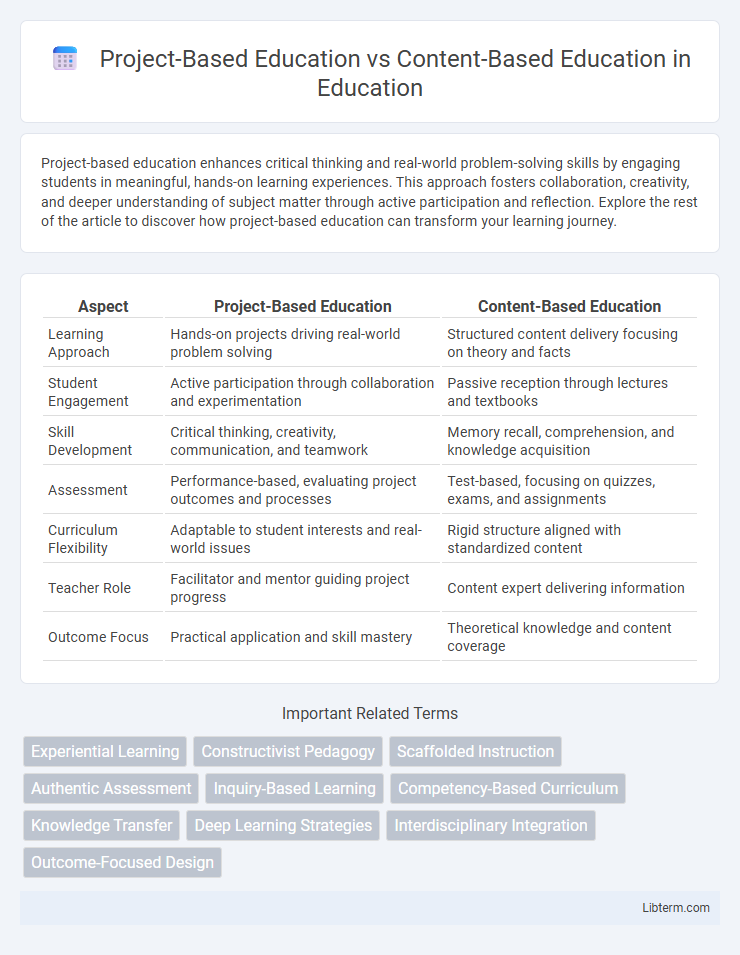Project-based education enhances critical thinking and real-world problem-solving skills by engaging students in meaningful, hands-on learning experiences. This approach fosters collaboration, creativity, and deeper understanding of subject matter through active participation and reflection. Explore the rest of the article to discover how project-based education can transform your learning journey.
Table of Comparison
| Aspect | Project-Based Education | Content-Based Education |
|---|---|---|
| Learning Approach | Hands-on projects driving real-world problem solving | Structured content delivery focusing on theory and facts |
| Student Engagement | Active participation through collaboration and experimentation | Passive reception through lectures and textbooks |
| Skill Development | Critical thinking, creativity, communication, and teamwork | Memory recall, comprehension, and knowledge acquisition |
| Assessment | Performance-based, evaluating project outcomes and processes | Test-based, focusing on quizzes, exams, and assignments |
| Curriculum Flexibility | Adaptable to student interests and real-world issues | Rigid structure aligned with standardized content |
| Teacher Role | Facilitator and mentor guiding project progress | Content expert delivering information |
| Outcome Focus | Practical application and skill mastery | Theoretical knowledge and content coverage |
Understanding Project-Based Education
Project-Based Education centers on active learning through real-world challenges, fostering critical thinking, collaboration, and problem-solving skills. This approach emphasizes student engagement by requiring learners to create tangible outcomes, integrating interdisciplinary knowledge and practical application. Research shows that Project-Based Education improves retention, motivation, and the ability to transfer skills across contexts compared to traditional Content-Based Education models.
Exploring Content-Based Education
Content-Based Education immerses students in subject matter by integrating language learning with academic content, promoting deeper understanding and retention of knowledge. This approach emphasizes mastering disciplinary concepts alongside developing language skills, enhancing cognitive abilities related to critical thinking and problem-solving. Research indicates that Content-Based Education improves student engagement and facilitates the application of knowledge in real-world contexts, making it effective for both language acquisition and academic achievement.
Core Principles of Project-Based Learning
Project-Based Learning (PBL) centers on experiential knowledge through real-world challenges, emphasizing student-driven inquiry, collaboration, and reflection, which fosters critical thinking and problem-solving skills. Unlike Content-Based Education that prioritizes memorization and passive absorption of information, PBL integrates cross-disciplinary content with hands-on activities to enhance engagement and retention. Core principles of PBL include authentic investigation, sustained inquiry, creation of a meaningful product, and student autonomy in managing their learning process.
Key Features of Content-Based Learning
Content-Based Learning centers on integrating subject matter knowledge with language development, emphasizing comprehension and analysis of academic content. Key features include the use of authentic materials, thematic units that connect language skills to real-world topics, and a focus on vocabulary acquisition within context. This approach encourages critical thinking through meaningful content, fostering deeper understanding and retention of both language and subject concepts.
Comparing Learning Outcomes
Project-based education promotes deeper understanding and retention by engaging students in real-world problem solving and active collaboration, leading to improved critical thinking and practical skills. Content-based education emphasizes mastery of specific knowledge and concepts through structured lectures and assessments, often resulting in strong factual recall but less application ability. Research indicates that project-based learners demonstrate higher motivation and better transfer of knowledge to new contexts compared to peers in content-based settings.
Student Engagement and Motivation
Project-Based Education enhances student engagement and motivation by allowing learners to apply knowledge in real-world contexts, fostering critical thinking and creativity. Content-Based Education primarily focuses on delivering structured information, which may limit active participation and intrinsic motivation. Research indicates that students in project-based settings demonstrate higher enthusiasm, deeper understanding, and better retention compared to traditional content-focused classrooms.
Assessment Methods in Both Approaches
Project-Based Education employs authentic assessment methods such as portfolios, presentations, and real-world problem-solving tasks that evaluate students' application of knowledge and critical thinking skills. Content-Based Education relies heavily on traditional assessment techniques like standardized tests and quizzes, focusing on memorization and comprehension of specific subject matter. The contrast in assessment methods highlights Project-Based Education's emphasis on skill demonstration and Content-Based Education's focus on content mastery.
Teacher Roles and Responsibilities
In Project-Based Education, teachers function as facilitators, guiding students through inquiry, collaboration, and real-world problem-solving while providing continuous feedback and support. Content-Based Education positions teachers as primary knowledge transmitters, responsible for delivering structured lessons and ensuring mastery of specific subject matter. The shift from content delivery to skill development in project-based settings demands teachers to adopt adaptive strategies, promote student autonomy, and assess learning through practical application rather than rote memorization.
Real-World Applications and Skill Development
Project-based education emphasizes real-world applications by engaging students in hands-on projects that mirror actual challenges, fostering critical thinking, collaboration, and problem-solving skills. Content-based education prioritizes mastery of subject knowledge and theoretical understanding, often through lectures and exams, which may limit opportunities for practical skill development. Integrating project-based methods enhances workforce readiness by bridging academic concepts with tangible experiences and applicable competencies.
Choosing the Right Approach for Your Classroom
Project-Based Education fosters critical thinking and real-world problem-solving by engaging students in hands-on projects, enhancing collaboration and creativity. Content-Based Education emphasizes structured knowledge acquisition and mastery of specific subjects, offering clear benchmarks for academic progress. Selecting the right approach depends on your classroom goals, student needs, and desired learning outcomes, balancing experiential learning with content mastery for optimal engagement and achievement.
Project-Based Education Infographic

 libterm.com
libterm.com